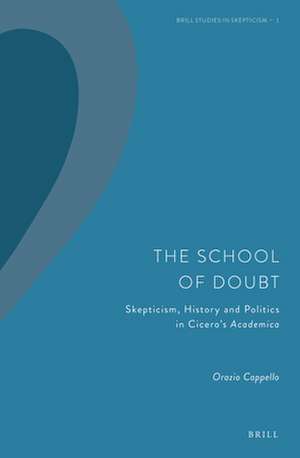The School of Doubt: Skepticism, History and Politics in Cicero's <i>Academica</i>: Brill Studies in Skepticism, cartea 1
Autor Orazio Cappelloen Limba Engleză Hardback – 31 ian 2019
Preț: 959.84 lei
Preț vechi: 1170.53 lei
-18% Nou
Puncte Express: 1440
Preț estimativ în valută:
183.75€ • 188.98$ • 152.44£
183.75€ • 188.98$ • 152.44£
Carte indisponibilă temporar
Doresc să fiu notificat când acest titlu va fi disponibil:
Se trimite...
Preluare comenzi: 021 569.72.76
Specificații
ISBN-13: 9789004389861
ISBN-10: 9004389865
Pagini: 382
Dimensiuni: 155 x 235 x 25 mm
Greutate: 0.66 kg
Editura: Brill
Colecția Brill
Seria Brill Studies in Skepticism
ISBN-10: 9004389865
Pagini: 382
Dimensiuni: 155 x 235 x 25 mm
Greutate: 0.66 kg
Editura: Brill
Colecția Brill
Seria Brill Studies in Skepticism
Cuprins
Acknowledgments
Introduction
1 The Shadows of Apography
1.1 Introduction
1.2 Stories from the Writer’s Desk: Documenting Cicero’s Writing of the Academica
1.3 Revision, Distribution and Reception: Cicero and His Academica
2 Counter-Figuring Indifference: Varro and the Politics of Composition
2.1 Epistolary Thresholds: The Letter in Its Context
2.2 The Letter as Reluctant Agit-Prop: The Correspondence between Cicero and Varro
2.3 The Dedication Letter: ad Familiares 9.8
3 Effecting Cicero: Fiction, Criticism and Subjectivity
3.1 The Epistolary Cicero: Dialogue, Friendship and the Subject of the Letters
3.2 On the Horizon: The Shrine to Tullia and Caesar’s Return
3.3 Conclusion
4 Historical Philosophy: Cicero and the Academica in Their Historiographical Contexts
4.1 Program Notes
4.2 Situating the Academica: The Corpus
4.3 Situating the Academica: The Tradition
4.4 Setting the Scene: Re-reading the Index
5 Philosophy’s Parallel Itineraries
5.1 Where Philosophy Begins: Epistemology and Historiography in the Academica
5.2 The Art of the Beginning: The Epistemological Foundation of Life
5.3 The Beginning of the Story/The Story of the Beginning
6 Progress and Other Stories: Historical Models in Cicero’s Philosophy
6.1 Revision, Imitation and Development in the Academica: The Alternative Paths of Philosophical History
6.2 Embedded Narratives, Narrative Inconsistencies and the Inclusivity of Cicero’s History
6.3 Organizing the Field: The Disagreement of Philosophers and the Carneadea Divisio
6.4 Structure and Meaning: Hegel, Gueroult and Cicero
6.5 Interpretation, Position and Segmentation: Arcesilaus and Carneades in the Lucullus
7 The Practice and Tradition of Philosophia: Debate, Critique and Community in the Academica
7.1 The Academy as Theatre
7.2 Critical Philosophy, or Philosophy at the Limit
7.3 Community: Reason, Canon and Philosophy
7.4 Conclusion
8 Re-Configuring Conflict: Looking for Philo and Antiochus
8.1 Who Speaks in the Academica
8.2 Framing the Dialogue: The Rhetoric of Philosophy
8.3 Antiochus versus Philo: Fictionalizing the Drift
8.4 Philo and Antiochus: Profiles in Conversation
8.5 Parallel Trajectories and the Myth of Crisis
9 Dialectic and Self-Definition: The Sense of Arguing in Cicero’s Academica
9.1 Debate and the Philosophical Tradition
9.2 The Academy and the Stoa
10 Dialectical Trajectories of Ciceronian Skepticism
10.1 Academic Skepticism in Cicero’s Academica
10.2 Into Subjectivity: Doubt and/as Experience
10.3 Conclusion
Conclusion
Bibliography
Introduction
Part 1: Skepticism and Its Contexts. The Academica in Cicero’s Correspondence
1 The Shadows of Apography
1.1 Introduction
1.2 Stories from the Writer’s Desk: Documenting Cicero’s Writing of the Academica
1.3 Revision, Distribution and Reception: Cicero and His Academica
2 Counter-Figuring Indifference: Varro and the Politics of Composition
2.1 Epistolary Thresholds: The Letter in Its Context
2.2 The Letter as Reluctant Agit-Prop: The Correspondence between Cicero and Varro
2.3 The Dedication Letter: ad Familiares 9.8
3 Effecting Cicero: Fiction, Criticism and Subjectivity
3.1 The Epistolary Cicero: Dialogue, Friendship and the Subject of the Letters
3.2 On the Horizon: The Shrine to Tullia and Caesar’s Return
3.3 Conclusion
Part 2: The Pedigree of Doubt: Ciceronian Essays in the Historiography of Philosophy
4 Historical Philosophy: Cicero and the Academica in Their Historiographical Contexts
4.1 Program Notes
4.2 Situating the Academica: The Corpus
4.3 Situating the Academica: The Tradition
4.4 Setting the Scene: Re-reading the Index
5 Philosophy’s Parallel Itineraries
5.1 Where Philosophy Begins: Epistemology and Historiography in the Academica
5.2 The Art of the Beginning: The Epistemological Foundation of Life
5.3 The Beginning of the Story/The Story of the Beginning
6 Progress and Other Stories: Historical Models in Cicero’s Philosophy
6.1 Revision, Imitation and Development in the Academica: The Alternative Paths of Philosophical History
6.2 Embedded Narratives, Narrative Inconsistencies and the Inclusivity of Cicero’s History
6.3 Organizing the Field: The Disagreement of Philosophers and the Carneadea Divisio
6.4 Structure and Meaning: Hegel, Gueroult and Cicero
6.5 Interpretation, Position and Segmentation: Arcesilaus and Carneades in the Lucullus
7 The Practice and Tradition of Philosophia: Debate, Critique and Community in the Academica
7.1 The Academy as Theatre
7.2 Critical Philosophy, or Philosophy at the Limit
7.3 Community: Reason, Canon and Philosophy
7.4 Conclusion
Part 3: Skeptical Strategies: Dialectic, Assimilation, Rhetoric
8 Re-Configuring Conflict: Looking for Philo and Antiochus
8.1 Who Speaks in the Academica
8.2 Framing the Dialogue: The Rhetoric of Philosophy
8.3 Antiochus versus Philo: Fictionalizing the Drift
8.4 Philo and Antiochus: Profiles in Conversation
8.5 Parallel Trajectories and the Myth of Crisis
9 Dialectic and Self-Definition: The Sense of Arguing in Cicero’s Academica
9.1 Debate and the Philosophical Tradition
9.2 The Academy and the Stoa
10 Dialectical Trajectories of Ciceronian Skepticism
10.1 Academic Skepticism in Cicero’s Academica
10.2 Into Subjectivity: Doubt and/as Experience
10.3 Conclusion
Conclusion
Bibliography
Notă biografică
Orazio Cappello lives in London.




